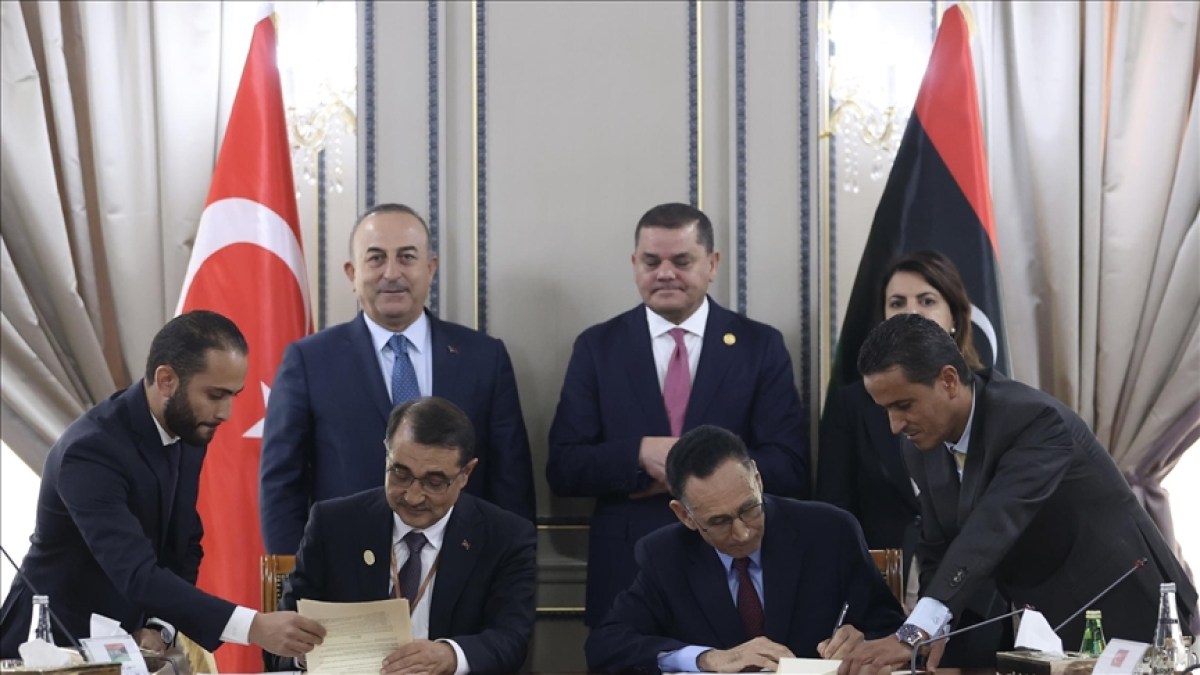Yesterday, Monday, the Libyan National Unity Government headed by Abdel Hamid al-Dabaiba signed a preliminary agreement with Turkey on oil and gas exploration, prompting Greece and Egypt to announce their opposition to any activity in the "disputed areas" in the eastern Mediterranean.
The agreement was also rejected by the Libyan parliament, which is based in the east of the country, and supports an alternative government headed by Fathi Bashagha.
Turkish Foreign Minister Mevlüt Çavuşoğlu and Libyan Foreign Minister Najla Al-Manqoush said at a ceremony in Tripoli that the deal is one of several agreements within a memorandum of understanding on economic issues aimed at benefiting the two countries.
It is not yet clear whether any projects will actually appear that include drilling in the "exclusive economic zone" agreed upon by Turkey and a previous government in Tripoli in 2019, which was rejected by Greece and Cyprus and criticized by Egypt and Israel.
Asked if other countries might object to the new MOU, Cavusoglu said, "We don't care what they think."
He added that other countries had no right to interfere.
For her part, Libyan Foreign Minister Najla Al-Manqoush welcomed this agreement, which she described as "important."
The spokesman for the Libyan Government of National Unity, Mohamed Hammouda, said that the memorandum of understanding signed with Turkey aims to develop projects for exploration, production, transportation and trading of oil and natural gas.
He added in a Facebook post, hours after signing the memorandum in the capital, Tripoli, during a visit by a Turkish delegation, that the memorandum of understanding provides for strengthening cooperation between the two countries in the practical, technical, legal, and commercial fields in the field of hydrocarbons (oil and gas), exchanging experiences and training, and ensuring common interests. The feasibility of exploration and development and increasing production of the two countries.
He explained that the two parties will cooperate based on their local laws to achieve the objectives of the memorandum, by exchanging information and experiences, holding conferences, joint seminars and exhibitions, and increasing cooperation between the public and private sectors.
rejected in the east
On the other hand, Parliament Speaker Aguila Saleh - who is seen as an ally of Egypt - said that any agreement, treaty or memorandum of understanding concluded by the Prime Minister of the National Unity Government is rejected and illegal, given the end of her mandate legally and the absence of any action she has taken since the end of her mandate on December 24 December 2021.
Saleh indicated that any memorandum or agreement must be made through the head of state or parliament, or through the legitimate government that has won the confidence of parliament, represented by the government of Fathi Bashagha.
In turn, the parliament-appointed government rejected the Turkey-Libya agreement.
The Bashagha government said - in a statement - that it will begin direct consultation with national, regional and international partners, to respond appropriately to these abuses that threaten the interest of security and peace in Libya and the region.
And she warned of her right to resort to the judiciary in order to stop the agreement, according to the statement.
The Minister of Foreign Affairs receives a call from the Minister of Foreign Affairs of Greece _________ The Spokesman for the Ministry of Foreign Affairs, Ambassador Ahmed Abu…
Published by the official page of the Egyptian Ministry of Foreign Affairs on Monday, October 3, 2022
Greek Egyptian rejection
In Athens, Greek Foreign Minister Nikos Dendias stressed - in a tweet - that he and his Egyptian counterpart, Sameh Shoukry, consider the Tripoli government to lack the legitimacy that entitles it to sign such an agreement.
Dendias revealed that he will go to Cairo on Sunday to hold "consultations" on this file.
The official spokesman for the Egyptian Foreign Ministry stated that the Egyptian and Greek foreign ministers stressed that the outgoing unity government in Tripoli does not have the authority to conclude any international agreements or memoranda of understanding.
The spokesman added that the two ministers agreed to continue consultation between them on various regional and international issues of common interest, within the framework of continuous coordination between the two countries.
Ankara concluded a military and security cooperation agreement and a maritime demarcation agreement in November 2019 with the former Tripoli-based Government of National Accord.
In August 2020, Egypt and Greece responded to the move with an agreement to delineate maritime borders in the eastern Mediterranean.
The maritime agreement allows Ankara to assert its rights in large areas of the eastern Mediterranean, which angers Greece and the European Union.
On the other hand, Turkey militarily assisted the former Tripoli government in repelling the mid-2020 attack on the capital launched by retired Major General Khalifa Haftar.
At the end of 2020, the Turkish parliament approved a proposal to extend permission to deploy the army in Libya for 18 months, as Ankara continues to exert significant influence throughout the western part.
Two governments have been competing for power in Libya since March. The first is the Tripoli government, which was established in 2021 as part of a peace process under the auspices of the United Nations, and the second is led by former Interior Minister Fathi Bashagha and supported by Haftar.

